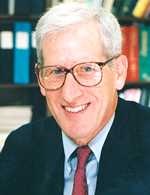Stuart A. Kornfeld, MD, the David C. and Betty Farrell Professor of Medicine, has received one of the highest awards in academic medicine, the 2010 George M. Kober Medal, from the Association of American Physicians.
Kornfeld was presented the award on April 23 during the association’s annual meeting in Chicago.
“The Kober Medal has always had a special meaning to me because of the extraordinary achievements of its previous recipients,” Kornfeld says. “I am deeply honored to have been selected.”

The award was named after George Kober, MD, a pioneer in public health reform in the late 1800s and early 1900s, and recognizes physicians who are leaders in academic medicine. Previous Washington University recipients include 1944 Nobelist Herbert S. Gasser, MD; W. Barry Wood Jr., MD; and David M. Kipnis, MD, Distinguished University Professor Emeritus of Medicine.
“Stuart is the very model of the quintessential physician-scientist,” says Ajit Varki, MD, Distinguished Professor of Medicine and Cellular and Molecular Medicine at the University of California, San Diego, and former research fellow of Kornfeld’s. “His career has been characterized by absolute commitment to scientific truth and personal honesty as well as complete disinterest in self promotion,” Varki says. Varki gave a presentation describing Kornfeld’s life and accomplishments at the award ceremony.
Kornfeld is a Washington University hematology specialist at Barnes-Jewish Hospital and professor of medicine in the Division of Hematology and professor of biochemistry and molecular biophysics. He earned a medical degree from Washington University School of Medicine in 1962.
After completing postgraduate training at Barnes Hospital and at the National Institutes of Health, he returned to the university as an instructor in medicine. He achieved full professorship in the brief span of six years. Kornfeld is a member of the National Academy of Sciences, the Institute of Medicine and the American Academy of Arts and Sciences.
In his early research, Kornfeld worked out the intricate steps that occur inside cells to build special sugar chains that become attached to individual proteins. The sugar chains affect the cellular functions of proteins and help direct them to their destinations.
He is best known for discovering how lysosomal enzymes are routed from where they are produced to where they are needed in lysosomes. These cellular structures digest complex molecules and parts of the cell that are no longer useful as well as helping rid the cell of bacteria and viruses. Kornfeld continues to research protein trafficking in cells, a multistep process that uses a series of recognition signals that mediate the sorting, packaging and transport of proteins.
The Association of American Physicians is a nonprofit professional organization composed of more than 1,000 active members and approximately 600 emeritus and honorary members from the United States, Canada and other countries. Once a year, individuals having attained excellence in advancing medical knowledge are recognized by nomination for membership in the association.
Washington University School of Medicine’s 2,100 employed and volunteer faculty physicians also are the medical staff of Barnes-Jewish and St. Louis Children’s hospitals. The School of Medicine is one of the leading medical research, teaching and patient care institutions in the nation, currently ranked fourth in the nation by U.S. News & World Report. Through its affiliations with Barnes-Jewish and St. Louis Children’s hospitals, the School of Medicine is linked to BJC HealthCare.